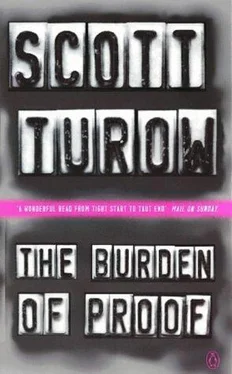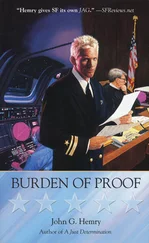Scott Turow - The Burden of Proof
Здесь есть возможность читать онлайн «Scott Turow - The Burden of Proof» весь текст электронной книги совершенно бесплатно (целиком полную версию без сокращений). В некоторых случаях можно слушать аудио, скачать через торрент в формате fb2 и присутствует краткое содержание. Жанр: Детектив, на английском языке. Описание произведения, (предисловие) а так же отзывы посетителей доступны на портале библиотеки ЛибКат.
- Название:The Burden of Proof
- Автор:
- Жанр:
- Год:неизвестен
- ISBN:нет данных
- Рейтинг книги:3 / 5. Голосов: 1
-
Избранное:Добавить в избранное
- Отзывы:
-
Ваша оценка:
- 60
- 1
- 2
- 3
- 4
- 5
The Burden of Proof: краткое содержание, описание и аннотация
Предлагаем к чтению аннотацию, описание, краткое содержание или предисловие (зависит от того, что написал сам автор книги «The Burden of Proof»). Если вы не нашли необходимую информацию о книге — напишите в комментариях, мы постараемся отыскать её.
The Burden of Proof — читать онлайн бесплатно полную книгу (весь текст) целиком
Ниже представлен текст книги, разбитый по страницам. Система сохранения места последней прочитанной страницы, позволяет с удобством читать онлайн бесплатно книгу «The Burden of Proof», без необходимости каждый раз заново искать на чём Вы остановились. Поставьте закладку, и сможете в любой момент перейти на страницу, на которой закончили чтение.
Интервал:
Закладка:
This was an exciting place. On the Exchange floor, the profusion of color and the volume were exceptional. It was like being on the playing field in a thronged athletic stadium. The huge black tote boards thirty feet overhead flashed in optic shades of orange, red, green, and yellow as their digits fell, while a red band of local and national news raced by below. Young people-runners, traders, order clerks-dashed about in their colored coats and corduroys, each looking purposeful, hyped-up, singleminded. The floor was confettied with discarded orders. In the meantime, in the tiered trading pits, the fundamental business went on, the brokers, the locals, the top stair men, forty and fifty deep, buying and selling in a screaming melee of surging hands. Fingers up and out; beckoning or refusing. From their black wrought-iron observation posts, the pit reporters overhead copied down each fill. For all the electronic circuitry, the phones and faxes and computers that took information to and from this place, at the junction point one still depended on physical skills: visual acuity, strong lungs, and good ears.
The din, the fierce voices, rang out incredibly. At the windows three stories above, various gawkers stood with' their faces pressed to the glass.
In this world, greed had annealed with some kind of benighted manliness, so that there was at times'an atmosphere of savagery. Young men-too many of them Jewish for Stern's comfort-moved about with astonishing swagger.
Twenty-eight years old, thirty. Kids who had barely schook. Downstairs, at a security desk, Stern was signed onto the floor for fifteen minutes.
Two years ago, a fellow in a wig had placed dozens of trades and disappeared without settling the losing transactions. Now, if Stern exceeded his granted time by more than a minute, a cadre of security officers would spill across the floor and pull him out as unceremoniously as a spy.
This was an exciting place. On the Exchange floor, the profusion of color and the volume were exceptional. It was like being on the playing field in a thronged athletic stadium. The huge black tote boards thirty feet overhead flashed in optic shades of orange, red, green, and yellow as their digits fell, while a red band of local and national news raced by below. Young people-runners, traders, order clerks-dashed about in their colored coats and corduroys, each looking purposeful, hyped-up, singleminded. The floor was confettied with discarded orders. In the meantime, in the tiered trading pits, the fundamental business went on, the brokers, the locals, the top stair men, forty and fifty deep, buying and selling in a screaming melee of surging hands. Fingers up and out; beckoning or refusing. From their black wrought-iron observation posts, the pit reporters overhead copied down each fill. For all the electronic circuitry, the phones and faxes and computers that took information to and from this place, at the junction point one still depended on physical skills: visual acuity, strong lungs, and good ears.
The din, the fierce voices, rang out incredibly. At the windows three stories above, various gawkers stood with' their faces pressed to the glass.
In this world, greed had annealed with some kind of benighted manliness, so that there was at times'an atmosphere of savagery. Young men-too many of them Jewish for Stern's comfort-moved about with astonishing swagger.
Twenty-eight years old, thirty. Kids who had barely scraped their way through high school had bought seats on the Exchange and traded for their own accounts, often making millions. Others would lose their shirts or trade away an accumulated fortune in a matter of days. It made no difference. Those who went into the pits wore the macho pride of bullfighters. Like cavemen they lived on the unpredidictable whims of wind and rain, markets, seasons.
This, they believed, made them tough. The risk made them high. Stern had heard stories, amusing if not true, of handjobs delivered in the jostling trading pits by certain female clerks. erity was not the point of these tales.
They emphasized the exhilarated air that many believed they breathed here. 'They had it better than ordinary dripspmoney, the blood of life, was always passing through their hands in staggering amounts. Once, years ago, when Dixon was still often on the floor, Stern had met him for lunch and found him conletting with four younger colleagues, all traders.
'I got this one,' a man'had said, moving in front of one of the elevators.
'For what?" a second asked.
'A bill." 'A big bill?"
"Right."
Dixon laughed and dug through his pockets. He stepped before the second elevator.
Eventually, the five of them passed the stakes down to Stern. A thousand dollars a man. In cash. They were betting on which elevator would come first.
A1, a dozen feet ahead of Stern on the floor, pointed to John in the MD trading booth, a narrow gray counter space that looked like a hotel newsstand. Between the pits, the various clearing corps had these tiny preserves where orders and fills could be phoned back and forth from the floor. Every inch down here was precious. Ten people would work in quarters closer than steerage.
John was on the phone now, writing furiously, talking 'back. Upstairs at the other end of the line, Dixon, doing his ugly deeds, had found him. He must have asked for John by name. Was he counting on John's loyalty or his ignorance? Probably both. John was eager to please him.
Dixon had mentioned that John had asked repeatedly to be advanced into the hurly-burly of the trading pits. He was not ready, Dixon said, had not been around long enough.
He kept John on the order desk, although John filled in down here whenever he could. Luke all the runners, the clerks, this business's perpetual flotsam and jetsam, John apparently shared the common dream:
Get experience. Get a seat. Get rich. The pits remained one of the few places left where an unpromising young person, a high-school loser, a kid without an electric guitar or four-three speed could still hit it big. John, Stern took it, wanted one more chance to make it.
John slid out of the booth while AI took his place. His son-in-law greeted Stern with much the same look of dismay Peter had recently.
After a futile effort at conversation, they returned to MD's office. The only space John had of his own was a desk in the midst of the tumultuous back office. John stopped there to throw down various papers, then directed Stern to a conference room. A magnificent photo of Kate stood on the desk amid John's piles. His daughter, Stern thought again, was an exceptional beauty.
Even chatting with his father-in-law, John looked childishly uncomfortable. His huge shoulders sloped, and he idly fingered an envelope on the desk. He wore the uniform of the floor, MD's unstructured navy cotton jacket, corduroys, and'a knotted tie dragged three or four inches below his open collar. A photo ID hung from his pocket.
What was there about this young man that Stern found so infuriating? He was reminiscent sometimes of a comic-strip oaf, so large and amiable that he deserved a balloon over his head: Duh. He was not dumb. Clara, for years, had been at pains to make that point. He had had no difficulty finishing college, long after his athletic career had ended.
But there was a fecklessness about him. Large, apple-cheeked, blond, plumper than in his playing days, he looked like an inflated two-year-old, with as little guile.
Stern was, convinced that the present matter would render him numb. He would have no intuition about how to proceed and few resources with which to manage the strain of the coming months. Stern had seen these situations throughout his profeSsional life: a family member, a business colleague, wn a rope by a prosecutor, offered freedom in exchange for testimony. Some tossed it back, with royal indifference. But not many. Most tried to save themselves, bargaining with the truth and appealing to those they implicated for understanding. They ended up scorned by everyone. It was hard to imagine John having the suppleness to endure this storm.
Читать дальшеИнтервал:
Закладка:
Похожие книги на «The Burden of Proof»
Представляем Вашему вниманию похожие книги на «The Burden of Proof» списком для выбора. Мы отобрали схожую по названию и смыслу литературу в надежде предоставить читателям больше вариантов отыскать новые, интересные, ещё непрочитанные произведения.
Обсуждение, отзывы о книге «The Burden of Proof» и просто собственные мнения читателей. Оставьте ваши комментарии, напишите, что Вы думаете о произведении, его смысле или главных героях. Укажите что конкретно понравилось, а что нет, и почему Вы так считаете.












